The Ticks are harmful as blood sucking parasites severely affect productivity of dairy animals and a major economic impediment, welfare concern in dairy farming. The Ticks bites reduce feed intake of animals due to irritation caused by feeding activities influencing the host’s metabolism. The sucking of not less than 30 drops of blood to complete its life cycle by each Tick leads to loss of blood that results in retarded growth and lowered body weights. Its control is practised in a variety of ways.
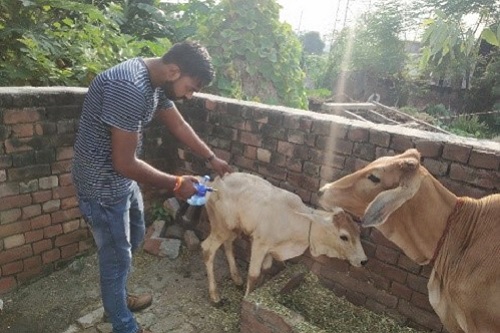
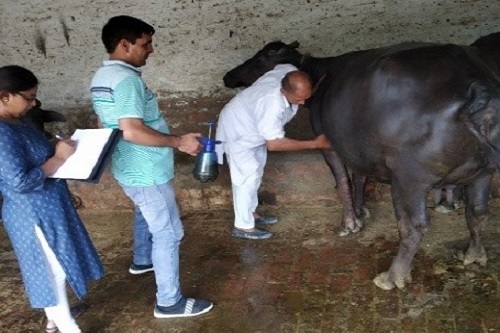
The hosts’ treatment with acaricides to kill the attached larvae, nymphs and adults is most widely practised though with constraints, as reoccurrence of the parasites is common. In such a scenario, the new chemical compounds’ introduction becomes necessary due to quick development of resistance in the Tick population. This is one of the challenges for sustaining the farming system as the problem has to be controlled in a cost-effective and sustainable manner.
The indigenous knowledge system offers a range of herbs with such acaricidal properties. The plant materials are known to possess insecticidal, growth inhibiting, anti-molting and repellent activities. The development of field oriented, cost-effective and easily available quality herbal acaricides for controlling the Ticks without any significant adverse effects on the environment is the need of the hour.
NIF Mediated Poly Herbal Medication
The National Innovation Foundation (NIF), India, an organisation under the DST, based in Gujarat brought out a Poly Herbal Medication involving Neem and Monk Pepper Leaves based on the ingenuity of community knowledge to control the Ticks and scientifically evaluated and demonstrated it in the different locations across the country.
Collaboration with ICAR-National Dairy Research Institute for field testing
The National Innovation Foundation collaborated with the ICAR-NDRI, Karnal, Haryana in the form of a Research Programme for field testing of Poly Herbal Medication. The Institute evaluated it with 47 farmers including 203 animals in 3 Districts of Haryana namely Karnal, Jind and Bhiwani during 2019-2020.
Method of preparation and application
The common herbal ingredients Indian lilac (Azadirachta indica) locally known as Neem and Monks Pepper (Vitex negundo) locally known as Nagod / Mala to be collected in the study regions. About 2.5 Kg of freshly collected leaves of Neem tree to be kept in 4 litres of lukewarm water and similarly, about 1 Kg of leaves of Nagod / Mala plant to be kept in 2 litres of lukewarm water. The preparation is kept overnight or approximately 12 hours duration under the normal room temperature. Subsequently, the crude extracts to be filtered and collected separately. About 300 ml of crude extracts of Neem and 100 ml of Monks Pepper were mixed in the ratio of 3:1 and kept as stock solution. The 400 ml preparation was mixed in 3,600 ml of fresh water / tap water for application at smallholder farm units at the times of requirements.
Administration of medicine
The Medicine was prepared and administered only for the first three days in the 8 villages of the Haryana Districts. It was administered two times daily, viz., both in morning and evening. The treatment solution (Azadirachta indica+ Vitex negundo) is provided for three days to animals affected with Ticks. After providing the treatment, the observations were recorded after 7th day, 14th day, 21st day and 28th day by counting the Ticks in udder, dewlap, ear and other body parts with cooperation of farmers, veterinary officers and scientists of LUVAS in the respective study areas.
Impact of poly herbal medication
The NIF’s Poly Herbal Medication resulted in significantly reducing the Tick population. The animals upon treatment with the NIF open source technology were found to reduce to 34.57±3.35 [Mean± S.E] by 48 hours. However, by the end of 56 hours, the reduction was 24.63±2.34 [Mean± S.E]. The observation upto 28th day reflected that there was not much recurrent infestation as the infestation rate was found to be 3.84±0.29. The percent efficacy of the preparation over infested animals was found to be 92.97% by 28th day of observation. The medicine at the farmers’ field showed efficacy over hard Tick infestation of Hyalomma Anatolicum. The recurrence of Tick infestation over treated animals was not noticed during the experimental period. Post treatment inhibitory efficacy upto 45 days over the natural infestation was found in all the study locations.
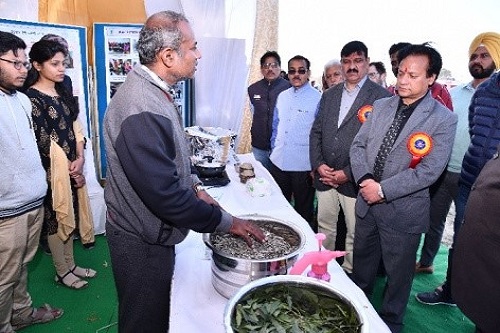
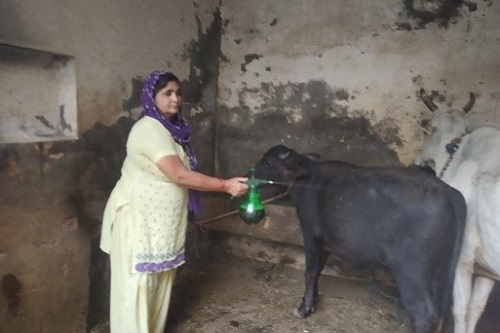
By using the NIF mediated Poly Herbal Medication, the farmers can repeat the treatment once in 40 to 45 days and incurred the expenditure of Rs. 1,440/- towards purchase of acaricides and veterinarian charge per animal per year with average recurrence of 25 to 30 days. The treatment cost is approximately Rs. 20 to Rs. 30 / animal / 45 days which works out to be Rs. 160 to Rs. 240 in one year. The farmers were convinced with the cost-effectiveness of the solution.
Scaling up
Besides, the easy availability of Neem in all the villages of Haryana, the Nirgundi (Vitex Negundo) was not widely prevalent in the study regions. Although, the elders recalled its usage about 40 to 50 years ago. As a part of up scaling the technology, the project team purchased 2,000 Nirgundi seedlings from Herbal Park, Forest Department, Haryana Government, Yamunanagar and distributed to 600 farmers in 30 villages including the villages adopted by the ICAR-NDRI and CSSRI under the Farmers’ FIRST Projects of the ICAR.
Considerable number of plants are planted in NDRI campus and various veterinary offices, polyclinics, KVKs and Hameti, Jind regions. The plants are expected to reinforce indigenous knowledge systems and assist in better utilization of locally available technologies for livestock welfare.
Conclusion
The characteristics of innovation like relative advantage, less complexity, trial ability and compatibility propelled the interest in NIF Poly Herbal Medication among the adopted and neighbouring farmers and veterinarians in Animal Husbandry Departments and LUVAS over the allopathic treatment.
The medicines’ successful demonstration will ensure cost-effective health care. The stakeholders of veterinary service like Veterinary Officers, Para Veterinary Staff were also sensitized with the usefulness of technology. Source: ICAR-National Dairy Research Institute, Karnal, Haryana.


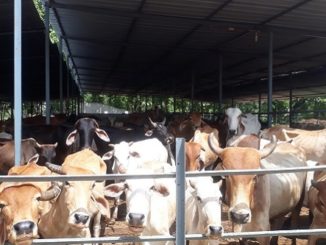
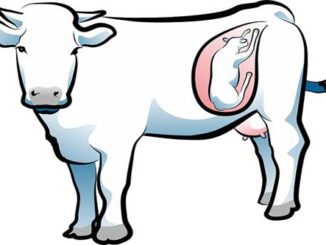
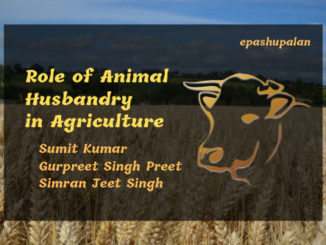

Be the first to comment